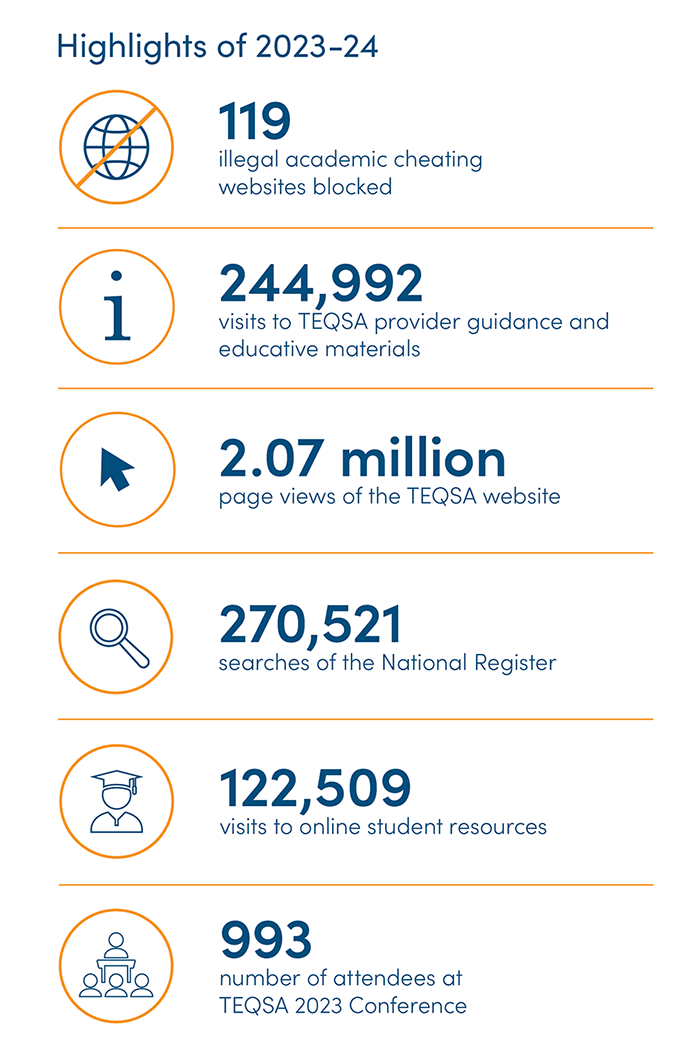Scope and intent of the Domain
This Domain (Sections 3.1-3.3) of the Higher Education Standards Framework (Threshold Standards) 2021 (HES Framework) encompasses:
- specific requirements for the specification of the course design and requirements for engagement with advanced knowledge and inquiry, current knowledge, theoretical frameworks and concepts, related scholarship and emerging ideas
- coherent achievement of learning outcomes and professional accreditation of a course of study if applicable
- sufficiency of staffing, capability of teaching staff, student access to staff
- the nature, appropriateness, quality and level of access to learning resources that are specific to the course of study.
Our commentary
3.1 Course Design
TEQSA expects not only that the provider’s specification of a course design (and its documentation) will comply with the requirements of Standard 3.1.1 (see also Public accessibility in Section 7.2), but also that sufficient detail of the conceptual underpinning of the course design (Standards 3.1.2–3.1.4) will be available for an expert in a relevant subject area to form a view on whether these Standards are met. We expect these requirements would be evident in the course proposal approved by the provider’s internal academic governance body/processes. In relation to Standard 3.1.5, we will require evidence from the relevant professional accrediting body where applicable and where available. This may involve some coordination with the professional body in relation to new providers/courses of study, where a provider may not be eligible to attain professional accreditation at the outset.
3.2 Staffing
This Section requires, and TEQSA will expect, a provider to demonstrate sufficient staffing to meet the educational, academic support, administrative and access needs of the student cohorts undertaking a course of study. This includes an overall staffing profile sufficient to provide collective academic leadership necessary to lead intellectual enquiry at the level required by the course of study. In particular, the Standards specify that academic teaching staff must be qualified to at least one level of qualification (Australian Qualifications Framework [AQF] level or equivalent) higher than the course of study being taught, or have equivalent relevant academic or professional or practice-based experience and expertise, except for staff who are supervising doctoral degrees who must themselves have a doctoral degree or equivalent research experience (see Standard 3.2.3). The Standards for research (Section 4.1) and research training (Section 4.2) also require staff to have relevant qualifications and experience. Staff who have leadership/oversight roles or teach significant components of a course of study must meet certain specified capabilities and qualifications as outlined in the Standards, including requirements for continuing scholarship that informs their teaching.
These requirements include knowledge of contemporary developments in the field they are teaching (which is informed by continuing scholarly activity), skills in teaching, learning and assessment relevant to the needs of the student cohorts involved, and a qualification at least one level higher than is awarded for the course of study, or equivalent experience.
Exceptions to these requirements are possible (Standard 3.2.4) in certain circumstances, such as teaching a specialised component of a course of study, provided the staff members who do not fully meet the requirements of the Standards are supervised by staff who do meet the Standard. We will need to be satisfied that the qualifications and experience of staff collectively and individually meet the requirements of the Standards.
Staff who hold academic leadership roles at any level need to have experience and qualifications at a level necessary for their responsibilities. Academic leaders at higher levels have an important role in guiding the development of a higher education learning environment within their scope of responsibility, including the development of advanced inquiry at the appropriate course level and staff scholarship.
TEQSA has found academic leadership to be a critical success factor, especially for applicants seeking to enter higher education for the first time.
Unusually high reliance on casual staff poses risks for the quality of the student experience, and we will investigate where high reliance on casual staff is combined with data indicating lower student outcomes. We do not set a threshold for the ratio of ongoing staff to casual staff, except for the purpose of risk assessment. Findings are made after considering contextual factors including qualifications, experience and depth of scholarship in academic leaders and the nature of the field.
3.3 Learning Resources and Educational Support
This Section focuses on both the quality of and access to learning resources that are specific to the learning needs of a course of study and its level. TEQSA will expect a provider to demonstrate that the learning resources provided and recommended are appropriate to the level of the course of study, consistent with the expected learning outcomes and modes of participation, and accessible when needed (including for individuals with special needs).
The Standard does not specify the form in which information resources are made available (whether physical books and journals or electronic databases), but they must be accessible by all students regardless of mode of delivery or location, and whether the course is delivered directly by the registered provider or by a third party. The quality of learning resources may be assessed in part by an external expert in the subject area and the resources will need to be specified in detail sufficient for such an expert to form a view on their quality and appropriateness. We do not regard sole reliance on other parties with whom the provider has no relationship (such as a municipal library) to provide resources as acceptable. We may require more or less information on learning management systems employed by a provider depending on our familiarity with the provider.
Relevant guidance notes
The following guidance notes can be accessed at our Guidance notes page, or from the links below:

